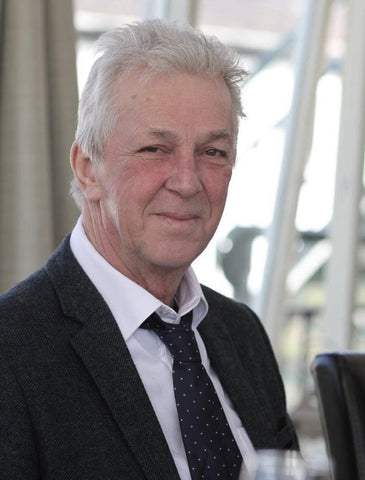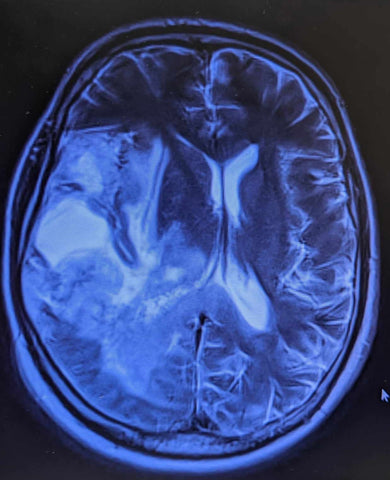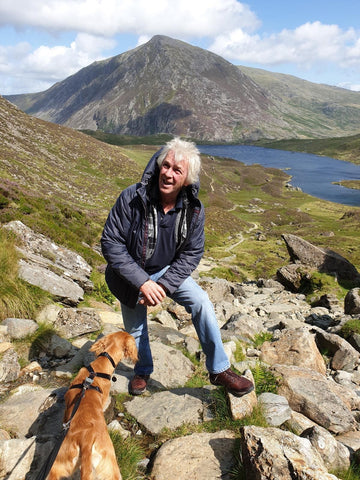Trevor Davies, 66, from Llandegla, North Wales, was diagnosed with a glioblastoma (GBM) following an MRI scan in February 2021. For years the father-of-three had been having seizures, which had been attributed to low blood pressure. The former fencing company owner underwent a biopsy, followed by radiotherapy and chemotherapy, and is now being monitored with scans every three months.

Trevor tells his story …
For at least 10 years before being diagnosed with a brain tumour, I had been having small seizures. I went to the doctor countless times, but I was told they were caused by low blood pressure. Eventually, I was referred to a cardiologist at Wrexham Maelor Hospital. I tried to describe to him how my episodes occurred, that my hand would go hot before I started shaking, but he told me I sounded like a hypochondriac. He did, however, send me for an MRI scan, which took place in February 2021.

The day after my scan, I got a call from the hospital asking me to go back in. They had found an abnormality on my brain. I was transferred to the Walton Centre, in Liverpool, where I learned I had a glioblastoma (GBM). I asked for my prognosis and was told I had just three months without treatment, or 18 months with. It was a huge shock for me and my wife, Mandy.
“Thankfully though, that was more than three years ago.”

I was given the option of having a debulking surgery, followed by radiotherapy and chemotherapy, or just radiation and oral chemo. I chose the latter, which took place at the North Wales Cancer Treatment Centre in Glan Clwyd Hospital, Denbighshire, and ran for around 10 months, but I did have a biopsy first, in March 2021, during which 32 samples of my tumour were taken. I was put on steroids to reduce the swelling in and around my brain, but they made my stomach swell so much I looked pregnant. I couldn’t bend down and was really uncomfortable.
“I also developed a problem with my hip, which severely affects my mobility, and had to shut my fencing company because I was no longer able to work.”
I dropped more than 2.5 stone in weight. I had always been quite muscly because my job involved heavy lifting, so I think much of this was due to muscle wastage.
“I was warned my treatment could cause short-term memory loss, and it has.”
It can be frustrating at times but it’s just one more thing my family and I have to deal with, as I look forward to what I hope will be at least another three years with them. I have monitoring scans every 12 weeks and am pleased to say my tumour has remained stable for the last 18 months. Long may that continue.

In the meantime, I’m trying to find new ways to fill my days. I’ve started doing paint-by-number and find I can quite happily lose myself in it for as much as four hours at a time. Mandy and I have two dogs and our daughter, Rachel, and son-in-law, Alex, got a photo of them turned into a painting for me to do, which turned out really well. It’s good to have a hobby. After my diagnosis, I swore I wasn’t going to slob about on the sofa.
“You have to keep on going and not give up.”
My family has already raised more than £1,000 for Brain Tumour Research, and now Alex has committed to running seven marathons in seven days in support of the charity. I think he’s loopy for doing it, but it’s for a great cause. I hope, having recently got my driving licence back after surrendering it, to be able to cheer him on for some of them. Anyone wishing to sponsor him can do so at www.justgiving.com/page/alex-trivino-1711997398362.
Trevor Davies
April 2024
Brain tumours are indiscriminate; they can affect anyone at any age. What’s more, they kill more children and adults under the age of 40 than any other cancer... yet just 1% of the national spend on cancer research has been allocated to this devastating disease since records began in 2002.
Brain Tumour Research is determined to change this.
If you have been inspired by Trevor’s story you may like to make a donation via www.braintumourresearch.org/donate or leave a gift in your will via www.braintumourresearch.org/legacy
Together we will find a cure

